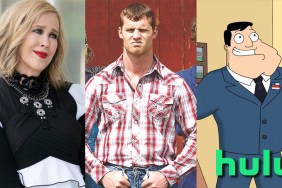
4 out of 10
Ted 2 Cast:
Mark Wahlberg as John Bennett
Seth MacFarlane as Ted Clubberlange
Amanda Seyfried as Samantha Leslie Jackson
Morgan Freeman as Patrick Meighan
Jessica Barth as Tami-Lynn McCafferty
Giovanni Ribisi as Donny
Richard Schiff as Steve
Patrick Warburton as Guy
Michael Dorn as Rick
Dennis Haysbert as Fertility Doctor
Liam Neeson as Customer
Sam J. Jones as himself
John Slattery as Shep Wild
Tom Brady as himself
Nana Visitor as Adoption Agent
Ron Canada as the Judge
Ted 2 Review:
Once upon a time, a ten-year-old boy made a wish that brought his teddy bear, Ted (MacFarlane), to life and though it was really weird for the first few decades, people got used to it and eventually people moved on and lived their lives happy-ish ever after. Except real life does not stop when the climax of the story being told is reached and then travels up and down in a never-ending rollercoaster that Ted the magical teddy bear – like all the rest of us – is stilling trying to learn how to ride.
And if that’s what Ted 2 was about, it would probably be successful at integrating the humor of a kid’s story pushed to ridiculous adult extremes the way its predecessor was. Instead it’s a monument to crassness, not just from the joke continually searching for lower lows, but from the perfunctory lack of imagination imbedded in every frame of a sequel which can find no reason why it exists other than it must.
In this Ted 2 movie review, there’s probably some form of existential meaning ripe for exploration and comedy in there – embodied by Ted himself – but instead writer-director MacFarlane has dutifully churned out the cinematic equivalent of Ted’s favorite recreational substance: a film which will make you laugh at stuff you will later realize wasn’t funny while simultaneously destroying your brain.
It’s not as if existentialism is outside Ted 2’s wheelhouse as Ted finds himself going to court to prove that he is actually a person and not the property of the grown up boy (Wahlberg) he was bequeathed to decades ago. For a series based on the idea of what happens after a teddy bear is magically brought to life, it’s a logical next step in the evolution of the character and one which should not be a hindrance to comedy in hands as experienced as MacFarlane’s.
Instead, it’s merely the foundation of a painfully clumsy metaphor about the struggle for marriage rights and what the denial of such rights says about society’s view on the humanity of the denied. Which could also make for a decent, if obvious, narrative unless it is used solely as the padding between a series of mostly non sequitur gags similar to MacFarlane’s animation approach. A few minutes of plot will stop dead to watch Wahlberg and Ted on a couch making up lyrics to the theme music for “Law & Order,” or for Liam Neeson to quiz Ted on whether or not Trix really are only for kids and if he will get in trouble for consuming them.
It’s intermittently funny but mostly exposes how poorly MacFarlane has adapted his technique to this format: the rapid fire back and forth which can cover up the defects of narrative in a condensed 22-minute format becomes disjointed and tedious when stretched out to feature length.
It’s also a delivery system which, though MacFarlane remains quite adroit at, leaves most of the film’s other actors often seem lost at sea (or shrieking cameos). With Ted unquestionably the lead, Wahlberg exists only because he has major name recognition and he was in the first film, but he is given little worthwhile to do except tag along in the search for a lawyer crazy enough to take Ted’s case. They find her in the form of Amanda Seyfried as a pot-loving junior lawyer hoping to win her first case (and replacing the departed Mila Kunis as the woman far too young to be in a relationship with Wahlberg) and who spends most of the movie looking bewildered at everything anyone says or does.
Ted is more convincing as a living, breathing teddy bear than either Seyfried or Wahlberg as living, breathing humans as they say their dialogue and perform their required actions without any hint that they know why they are doing either except that it was called for in the script. When a crucial legal decision goes against them, Ted disappears into the bowels of New York leaving Seyfried and Wahlberg to stand around reciting dialogue at each other like drama club students putting on their first play and struggling vainly just to remember their lines.
The original Ted displayed enough thought and insight into its premise that it was able to produce actual charm even at its most grotesque. Ted 2 prefers to go through the motions as MacFarlane falls back on tried and true methods without bothering to integrate them into the story or the characters. He increasingly veers into humor which has nothing to do with either and seems completely divorced from the film it is a part of.
Either the jokes appear from left field or from deep in the realms of geek pop culture he has such an affinity for (there’s a running gag about Seyfried not getting any of Wahlberg or MacFarlane’s references which isn’t funny the first time and gets progressively less so as it is endlessly repeated) until it reaches its logical apotheosis – a climax occurring at the New York Comic Con.
In fact the Comic Con sequence sums up much of what’s wrong with Ted 2: it’s self-indulgent and has little to do with what the film is purportedly about while filed with material that should be funny – Michael Dorn and Patrick Warburton dressed as their popular television alter-egos and bullying attendees – but isn’t. And like most of the film’s jokes it requires a significant amount of clumsy set-up for too little a payoff.
It’s hard to make even one good film, much less a sequel which can stand and deliver on its own merits. Ted 2 isn’t interested in doing either; like its lead it prefers to while away its days smoking on the couch, putting in as little effort as needed to keep breathing. At some level it seems MacFarlane is aware of the hack work on display, enough that the main characters even bring it up in conversation, but then like so much else in the film they drop the idea in what may well top A Million Ways to Die in the West as the black sheep of MacFarlane’s feature-film work.
Ted’s own dark night of the soul occurs in the offices of Morgan Freeman’s civil rights lawyer, who refuses to take Ted’s case because he is such a useless person it would just be a waste of effort even if successful. It’s too bad no one came to the same conclusion about the movie he was in.
Ted 2
-
Ted 2

-
Ted 2

-
Ted 2

-
Ted 2

-
Ted 2

-
Ted 2










